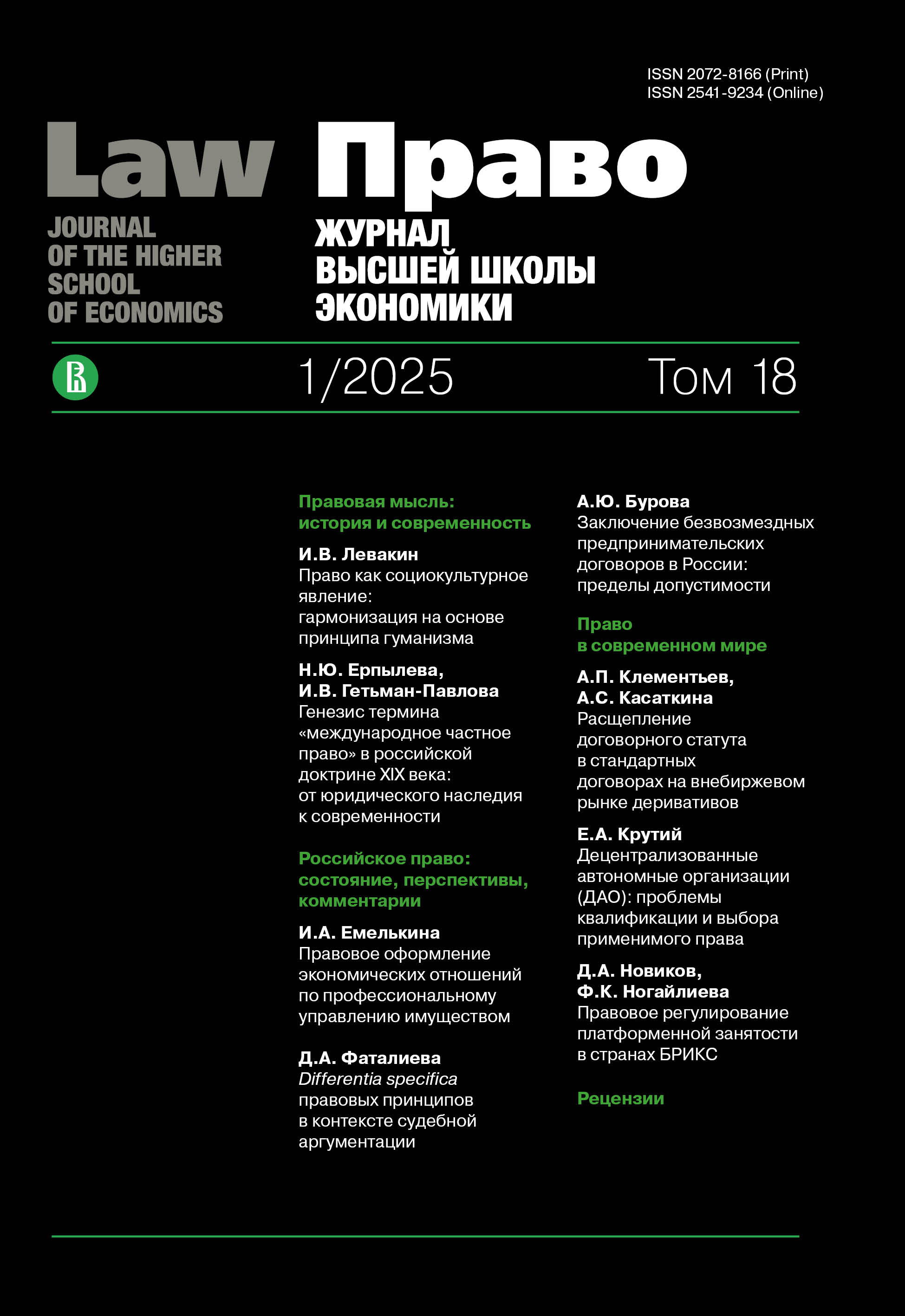Расщепление договорного статута в стандартных договорах на внебиржевом рынке деривативов
Аннотация
В статье рассматривается расщепление договорного статута (dépeçage) как явление, получившее признание в международном частном праве, на примере стандартной документации для внебиржевых деривативов (производных финансовых инструментов), подготовленной Международной ассоциацией по свопам и деривативам (ISDA), Европейской банковской федерацией (EBF) и Комитета по валютным операциям (FXC). Рассматриваемая документация является комплексной и состоит из множества структурных элементов, таких как рамочный договор, приложение к нему, подтверждения по отдельным финансовым сделкам и приложения (договоры) о кредитной поддержке, на основе которых происходит передача финансового обеспечения. Эти элементы «архитектуры» документации образуют единое соглашение сторон в силу принципа единого договора. Право, применимое к рамочному договору, а следовательно, и единому соглашению в целом, определяется непосредственно приложении к нему. Однако при использовании приложений (договоров) о кредитной поддержке возможно расщепление договорного статута, поскольку применимое к этим документам право может отличаться от права, избранного в отношении единого договора. Согласно сложившейся в доктрине и многочисленных источниках точке зрения, расщепление договорного статута является допустимым в той степени, в которой оно не ведет к противоречиям в виде применения двух разных правовых систем к одному и тому же вопросу.
Литература
Asoskov A.V. (2017) Conflict of Laws Regulation of Contractual Obligations. Moscow: M-Logos, 640 p. (in Russ.)
Aubart A. (2013) Die Behandlung der dépeçage im europäischen Internationalen Privatrecht. Berlin: Mohr Siebeck, 248 S.
Azoulay K. (2021) Lex contractus or lex arbitri? The UK Supreme Court sets the rules on the law applicable to the arbitration agreement: Enka v Chubb [2020] UKSC 38. Civil Justice Quarterly, no. 3, pp. 176-188.
Basedow J. (2009) Handworterbuch des Europaischen Privatrechts: Bd.1: Abschlussprufer-Kartellverfahrensrecht (A-Kar). Tubingen: Mohr Siebeck, 964 S.
Benjamin J. (2007) Financial Law. Oxford: University Press, 654 p. DOI: https://doi.org/10.1093/oso/9780199282937.001.0001
Benzler M. (1999) Nettingvereinbarungen im Auserborglichen derivatehandel Nomosverlagsgesellschaft. Baden-Baden: Nomos Verlagsgesellschaft, 409 S.
D' Hollander J. (1996) L'émergence des produits dérivés: le cas du Québec. Les Cahiers de droit, vol. 37, no. 2, pp. 377-407. DOI: https://doi.org/10.7202/043391ar
Fuchs F. (2013) Close-out Netting, Collateral und systemisches Risiko: Rechtsansätze zur Minderung der Systemgefahr im außerbörslichen Derivatehandel. Berlin: Mohr Siebeck. 437 S.
Gullifer L. (2021) Interpretation of Market Standard Form Contracts. Journal of Business Law, no. 3, pp. 227-245.
Hook M. (2016) The Choice of Law Contract. Oxford: Bloomsbury Publishing, 255 p.
Lutkova O.V. (2016) The Splitting of Statute in International Private Law. Zhurnal rossyiskogo prava=Russian Law Journal, no. 4, pp. 133-142 (in Russ.) DOI: https://doi.org/10.12737/18701
Majorina M.V. (2012) The Choice of Law with Respect to Mixed and Innominate Contracts. Zhurnal rossiyskogo prava=Journal of Russian Law, no. 10, pp. 72-81 (in Russ.)
Novikova T.V. (2020) The Formulation of the Agreement on the Applicable Law in Context of Depecage Admissability. Jurist=The Lawyer, no. 5, pp. 18-22 (in Russ.) DOI: https://doi.org/10.18572/1812-3929-2020-5-18-22
Paech Ph. (2014) Close-Out Netting, Insolvency Law and Conflict-of-Laws. Journal of Corporate Law Studies, vol. 14, no. 2, pp. 419-452. DOI: https://doi.org/10.5235/14735970.14.2.419
Parker E., McGarry A. (2009) The ISDA Master Agreement and CSA: close-out weaknesses exposed in the banking crisis and suggestions for change. Butterworths Journal of International Banking and Finance Law, no. 1, pp. 16-19.
Rogerson P., Collier J. (2013) Collier's Conflict of Laws. Cambridge: University Press, 514 p. DOI: https://doi.org/10.1017/CBO9781139048798
Van Galster G. (2016) European Private International Law. Portland: Hart, 576 p.
Werner P. (2012) Close-out Netting and the World of Derivatives in Central and Eastern Europe and beyond — ISDA's Perspective. In: Law in Transition. Developing Capital Markets. London: European Bank for Reconstruction and Development, pp. 48-55.
Wood Ph. (1995) Title Finance, Derivatives, Securitizations and Netting. Law and Practice of International Finance. London: Sweet and Maxwell, 251 p.
Copyright (c) 2025 Клементьев А.П., Касаткина А.С.

Это произведение доступно по лицензии Creative Commons «Attribution-ShareAlike» («Атрибуция — На тех же условиях») 4.0 Всемирная.


















